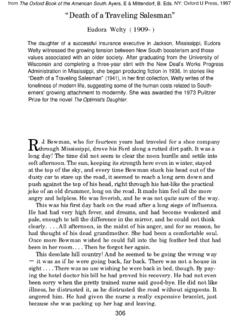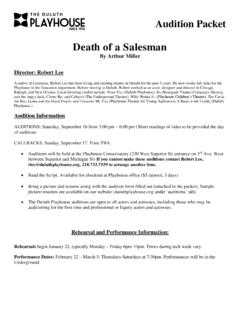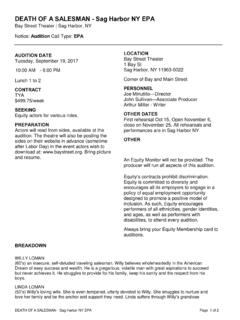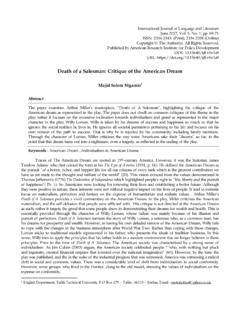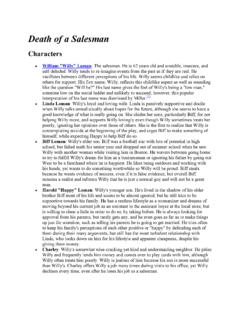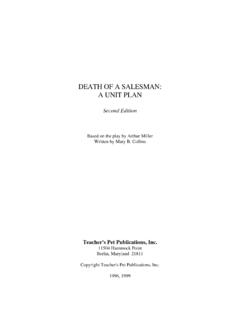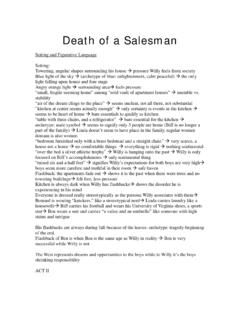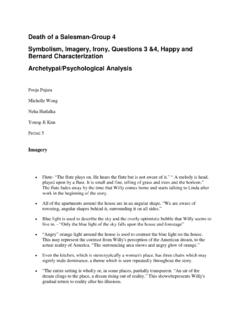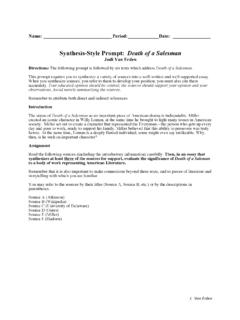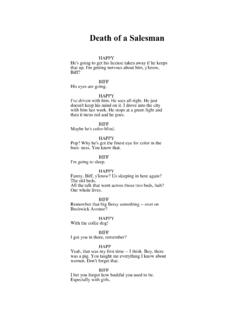Transcription of An Anti-social Socialist: A Critical Reading of Arthur ...
1 ISSN 1798-4769 Journal of Language Teaching and Research, Vol. 2, No. 2, pp. 353-358, March 2011 2011 ACADEMY PUBLISHER Manufactured in Finland. 2011 ACADEMY PUBLISHER An Anti-social socialist : A Critical Reading of Arthur miller s death of a salesman Kaveh Khodambashi Emami ACECR, Isfahan University of Technology, Isfahan, Iran Abstract For long Arthur miller and his plays were praised (especially by Marxist critics) as strong critics of capitalist societies and their dehumanizing force upon individuals living in them. Using Frankfurth school's views, miller 's own ideas and his play death of a salesman , this paper reveals some faults and contradictions in characterization, plot and other aspects of the play that would question miller 's opposition against capitalism and his criticism of it.
2 Index Terms death of a salesman , Capitalism, high culture, Marxism, popular culture, social play I. INTRODUCTION In his plays miller has dealt mostly with the social issues of his day and this is the case with death of a salesman too. It is probably this characteristic that caused death of a salesman to be the center for much Critical debate as to what it signifies, right from the beginning. Among those who so much celebrated the play were critics with a Marxist line of thought. They perceived it as a social play , an attack upon, or a criticism of society and its system of beliefs, knowing Willy Loman (the major character of the play) to be flawless.
3 They also labeled miller as a true social writer who is Critical of capitalist society and its values (Finkelstein, 1967) (Gassner, 1954) (Lewis, 1970). On the other hand, there appeared a growing trend among many of those who approached this play to condemn Willy Loman out of hand, believing his actions to be the root of his destruction and knowing society to be free of any guilt (Corrigan, 1969) (Carson, 1982) (Downer, 1967) (Lumley, 1967). Though personally I find the arguments put forward by the former group stronger and more valuable there are some points which I think left unnoticed by these critics which make them unable to account for some of the seemingly contradictory aspects of the play.
4 The major task of the present paper is to analyze the play with the help of Marxist literary criticism but in a way that enables us to solve all the doubts and contradictions of the play and finally to answer the question of whether we can call it a " social play" (as celebrated by most of the Marxist critics) or not. To do so it is most helpful first to grasp some ideas about literature and social criticism, the way a writer deals with social matters and how important his social and political views can be in shaping his works from Marxist point of view. Even those only slightly acquainted with the Marxist criticism know that what it wants from a writer is to commit his art to the cause of the proletariat.
5 The principle doctrine related to this topic was called Proletkult . The doctrine states that Literature must be tendentious, party minded, optimistic and heroic; it should be infused with a revolutionary romanticism, portraying heroes and prefiguring the future (Eagleton, 2001, ). In this regard there is Marx s view about the relation between a writer s social and political views and his writings. Marx says in a criticism of Sue LaSalle s novel, that what it shows diverges from what it says. He adds that French bourgeois ideology is the dominant ideology in the work and the main force that caused the novel to sell so well, but at the same time the novel can occasionally reach beyond its ideological limits and deliver a slap in the face of bourgeois prejudice (Eagleton, 2001, ).
6 As Eagleton argues, according to Luckacs modern writers should do more than merely reflect the despair and ennui of late bourgeois society; they should try to take up a Critical perspective on this futility, revealing positive possibilities beyond it (Eagleton, 2001, ). On the other hand according to Eagleton, if we regard Brecht s ideas about theatre and its role in the society, we see that he believed bourgeois art to be based on illusion. With the help of this illusion it makes people think that what is presented to them is reality itself. The audience in bourgeois theatre is the passive consumer of a finished, unchangeable art object offered to them as real (Eagleton, 2001, ).
7 The play does not allow the audience to think about how it is made, how it represents its characters and events and in what ways (if there is any) can these characters be different from what they are. Because the dramatic illusion conceals the fact that it is constructed, it prevents an audience from reflecting critically on both the mode of representation and the actions represented (Eagleton, 2001, ). Brecht recognized that this reflected an ideological belief that the world was fixed, and unchangeable, and that the function of the theatre was to provide escapist entertainment for men trapped in that assumption (Eagleton, 2001, ).
8 So we see that bourgeois art (which is the dominant form of art according to Brecht) is exactly the opposite of the " social " art that Marxist writers and critics use to favor and praise. The art that Marxists believed in is the art that is revolutionary, an art which shows the short comings of the bourgeois system and makes the audience react against it and eventually bring about the change required. Regarding the different views discussed above, JOURNAL OF LANGUAGE TEACHING AND RESEARCH 2011 ACADEMY PUBLISHER 354 miller s relationship with his plays, the subject he deals with in them and the way he deals with those subjects can be discussed and analyzed.
9 II. ANALYSIS OF THE PLAY What miller asks for is a theater of heightened consciousness. He speaks of two passions in man, the passion to feel and the passion to know. He believes that we need, and can have, more of the latter in his plays. miller believes that drama must help us to know more and not merely to spend our feelings (Corrigan, 1969, ). Elsewhere he says the end of the drama is the creation of a higher consciousness and not merely a subjective attack upon the audience s nerves and feelings (Williams, 1971, ). This idea is akin to that of Brecht mentioned before. But these prove to be merely ideas since we can hardly find any traces of them in this play.
10 Here a controversial scene would be the final Requiem scene, where Linda, his two sons, and Charley are at Willy s burial ceremony. The way this part is structured and the characters speeches are formed seems to make it an unnecessary and detached part of the play. Linda s cries and statements or Charley s words that are used to justify Willy s actions have only one function; that is to sell Willy to the audience and to get the maximum tears out of them. There seems to be no reason for the sudden change in the mind of Charley, regarding Willy s ideals. Charley used to criticize Willy for his wrong ideas and values and tried to make him understand that having dreams is of no use, but in the last scene we see him defending Willy by saying that a salesman has got to dream (Perrine, , 1974, ).







